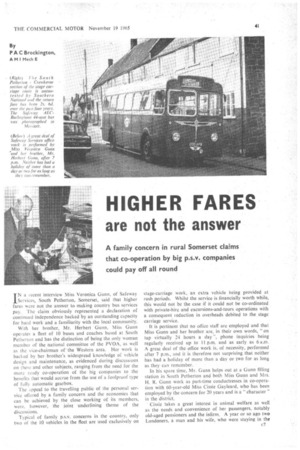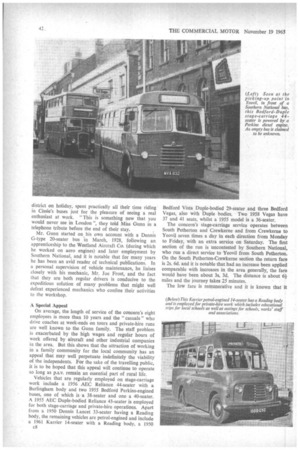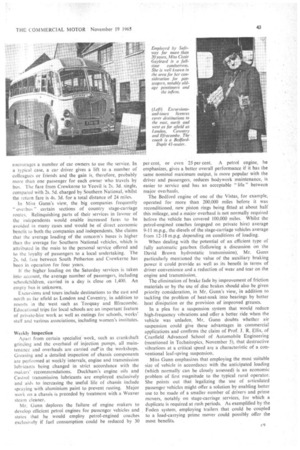HIGHER FARES
Page 43

Page 44

Page 45

If you've noticed an error in this article please click here to report it so we can fix it.
are not the answer
A family concern in rural Somerset claims that co-operation by big p.s.v. companies could pay off all round IN a recent interview Miss Veronica Gunn, of Safeway Services, South Petherton, Somerset, said that higher fares were not the answer to making country bus services pay. The claim obviously represented a declaration of continued independence backed by an outstanding capacity for hard work and a familiarity with the local community.
With her brother, Mr. Herbert Gunn, Miss Gunn operates a fleet of 10 buses and coaches based at South Petherton and has the distinction of being the only woman member of the national committee of thc PVOA, as well as the vice-chairman of the Western area. Her work is backed by her brother's widespread knowledge of vehicle design and maintenance, as evidenced during discussions on these and other subjects, ranging from the need for the more ready co-operation of the big companies to the benefits that would accrue from the use of a foolproof type of fully automatic gearbox.
The appeal to the travelling public of the personal service offered by a family concern and the economies that can be achieved by the close working of its members, were, however, the joint underlining theme of the discussions.
Typical of family p.s.v. concerns in the country, only two of the 10 vehicles in the fleet are used exclusively on stage-carriage work, an extra vehicle being provided at rush periods. Whilst the service is financially worth while, this would not be the case if it could not be co-ordinated with private-hire and excursions-and-tours operations with a consequent reduction in overheads debited to the stage carriage service.
It is pertinent that no office staff are employed and that Miss Gunn and her, brother are, in their own words, "on tap virtually 24 hours a day ", phone inquiries being regularly received up to 11 p.m. and as early as 6 a.m. A great deal of the office work is, of necessity, performed after 7 p.m., and it is therefore not surprising that neither has had a holiday of more than a day or two for as long as they can remember.
In his spare time, Mr. Gunn helps out at a Gunn filling station in South Petherton and both Miss Gunn and Mrs. H. R. Gunn work as part-time conductresses in co-operation with 60-year-old Miss Cissie Gayleard, who has been employed by the concern for 20 years and is a " character " in the district, • • Cissie takes a great interest in animal welfare as well as the needs and convenience of her passengers, notably old-aged pensioners and the infirm. A year or so ago two Londoners, a man and his wife, who were staying in the district on holiday, spent practically all their time riding in Cissie's buses just for the pleasure of seeing a real enthusiast at work. "This is something new that you would never see in London ", they told Miss Gunn in a telephone tribute before the end of their stay.
Mr. Gunn started on his own account with a Dennis G-type 20-seater bus in March, 1928, following an apprenticeship to the Westland Aircraft Co. (during which he worked on aero engines) and later employment by Southern National, and it is notable that for many years he has been an avid reader of technical publications. In a personal supervision of vehicle maintenance, he liaises closely with his mechanic, Mr. Joe Frost, and the fact that they are both regular drivers is conducive to the expeditious solution of many problems that might well defeat experienced mechanics who confine their activities to the workshop.
A Special Appeal On average, the length of service of the concern's eight employees is more than 10 years and the "casuals" who drive coaches at week-ends on tours and private-hire runs are well known to the Gunn family. The staff problem is exacerbated by the high wages and regular hours of work offered by aircraft and other industrial companies in the area. But this shows that the attraction of working in a family community for the local community has an appeal that may well perpetuate indefinitely the viability of the independents. For the sake of the travelling public, it is to be hoped that this appeal will continue to operate so long as p.s.v. remain an essential part of rural life.
Vehicles that are regularly employed on stage-carriage work include a 1956 AEC Reliance 44-seater with a Burlingham body and two 1955 Bedford Perkins-engined buses, one of which is a 38-seater and one a 40-seater. A 1955 AEC Duple-bodied Reliance 43-seater is employed for both stage-carriage and private-hire operations. Apart from a 1950 Dennis Lancet 33-seater having a Reading body, the remaining vehicles are petrol-engined and include a 1961 Karrier I4-seater with a Reading body, a 1950 c8 Bedford Vista Duple-bodied 29-seater and three Bedford Vegas, also with Duple bodies. Two 1958 Vegas have 37 and 41 seats, whilst a 1955 model is a 36-seater.
The concern's stage-carriage service operates between South Petherton and Crewkeme and from Crewkerne to Yeovil seven times a day in each direction from Monday to Friday, with an extra service on Saturday. The first section of the run is uncontested by Southern National, who run a direct service to Yeovil from South Petherton. On the South Petherton-Crewkeme section the return fare is 2s. 6d. and it is notable that had an increase been applied comparable with increases in the area generally, the fare would have been about 3s. 3d. The distance is about 64 miles and the journey takes 25 minutes.
The low fare is remunerative and it is known that it
encourages a number of car owners to use the service. In a typical case, a car driver gives a lift to a number of colleagues or friends and the gain is, therefore, probably more than one passenger for each owner who travels by bus. The fare from Crewkerne to Yeovil is 2s. 3d. single, compared with 2s. 5d. charged by Southern National, whilst the return fare is 4s. 3d. for a total distance of 24 miles, In Miss Gunn's view, the big companies frequently " overbus " certain sections of country stage-carriage routes. Relinquishing parts of their services in favour of the independents would enable increased fares to be avoided in many cases and would be of direct economic benefit to both the companies and independents. She claims that the average loading of the concern's buses is higher than the average for Southern National vehicles, which is attributed in the main to the personal service offered and to the loyalty of passengers to a local undertaking. The 2s. 6d. fare between South Petherton and Crewkerne has been in operation for four years.
if the higher loading on the •Saturday services is taken into account, the average number of passengers, including schoolchildren, carried in a day is close on 1,400. An empty bus is unknown.
Excursions and tours include destinations to the east and north as far afield as London and Coventry, in addition to resorts in the west such as Torquay and Ilfracombe. Educational trips for local schools are an important feature of private-hire work as well as outings for schools, works'. staff and various associations, including women's institutes.
Weekly Inspection
Apart from certain specialist work, such as crankshaft grinding and the overhaul Of injection pumps, all maintenance and overhauls are carried out•in the workshops. Greasing and a detailed inspectionof chassis components are performed at weekly intervals, engine and transmission lubricants being changed in strict accordance with the makers recommendations. Duckham's engine oils and Cast ml transmission lubricants are employed exclusively and aids to increasing the useful life of chassis include spraying with aluminium paint to prevent rusting. Major work on a chassis is preceded by treatment with a Weaver steam eaner.
Mr. Gunn deplores the failure of engine makers to develop efficient petrol engines for passenger vehicles and states that he would employ petrol-engined coaches exclusively if fuel consumption could be reduced by 30 per cent, or even 25 per cent. A petrol engine, he emphasizes, gives a better overall performance if it has the same nominal maximum output, is more popular with the driver and passengers, reduces bodywork maintenance, is easier to service and has an acceptable " life" between major overhauls.
The Bedford engine of one of the Vistas, for example, operated for more than 200,000 miles before it was reconditioned, new piston rings being fitted at about half this mileage, and a major overhaul is not normally required before the vehicle has covered 100,000 miles. Whilst the petrol-engined coaches (engaged on private hire) average 9-11 m.p.g., the diesels of the stage-carriage vehicles average from 12-18 m.p.g. depending on conditions of loading.
When dealing with the potential of an efficient type of fully automatic gearbox (following a discussion on the David Brown hydrostatic transmission), Mr. Gunn particularly mentioned the value of the auxiliary braking power it could provide as well as its benefit in terms of driver convenience and a reduction of wear and tear on the engine and transmission.
The elimination of brake fade by improvement of friction materials or by the use of disc brakes should also be given priority consideration, in Mr. Gunn's view, in addition to tackling the problem of heat-soak into bearings by better heat dissipation or the provision of improved greases.
In a plea for a suspension system that would reduce high-frequency vibrations and offer a better ride when the vehicle was unladen, Mr. Gunn doubts whether air suspension could give these advantages in commercial applications and confirms the claim of Prof. J. R. Ellis, of Cranfield Advanced School of Automobile Engineering (mentioned in Technitopics, November 5), that destructive vibrations at a critical speed are a characteristic of a conventional leaf-spring suspension.
Miss Gunn emphasizes that employing the most suitable size of vehicle in accordance with the anticipated loading (which normally can be closely assessed) is an economic problem of first magnitude to the typical rural operator. She points out that legalizing the use of articulated passenger vehicles might offer a solution by enabling better use to be made of a smaller number of drivers and prime movers, notably on stage-carriage services, for which a duplicate is required at rush periods. As exemplified by the Foden system, employing trailers that could be coupled to a load-carrying prime mover could possibly offer the most benefits.
















































































































































